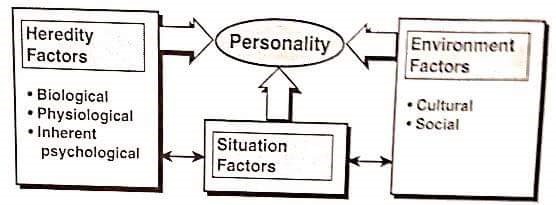Personality is a dynamic concept. It is concerned with the whole person. It is sum total of the ways in which an individual reacts and interacts with others. Various factors determine an individual’s personality.
They are as follows:

1. Heredity Factors:
It is the genetic background inherited from parents. Biological, physiological and inherent psychological make-up influence an individual’s gender, physical status, facial attractiveness, temperament, muscle composition, reflexes, and energy level.
Personality is not completely determined by heredity. Nor is it predetermined at birth. However, heredity profoundly influences the development of personality. It sets the parameters for personality development. Parameters are outer limits.
2. Environment Factors:
The environment to which an individual is exposed plays a significant role in shaping personality. It is the source of early conditioning.
The environmental factors shaping personality are:
- Cultural factors- Culture establishes norms, values and attitudes. They are passed from generation to generation. Different cultures encourages and prohibit different types of behaviors. Cultural factors influence the development of personality of a member of the cultural group.
- Social factors- Experiences in social settings directly influence personality through:
-
- Life experiences- Early conditioning by parents, schools and society. Life experiences.
- Norms- They can be among family, friends, reference groups.
- Group members- Reactions and interactions with other people in the group.
An individual’s full potential is determined by how well s/he adjusts to environmental demands.
3. Situational Factors:
Individual’s interactions with situation moderate the effect of heredity and environment on personality.
An individual’s personality tends to change in different situational contexts. Individual differences in personality also result from situational influences.
The effects of heredity and environment on personality are moderated by situation.
Individual Differences
Individual are different from one another due to key demographic differences such as: gender, race, ethnicity, age, etc. These differences lead to individual differences in terms of physical, psychological and emotional qualities that finally influence their behavior and performance at work.
Not only this individual seek for different types of rewards too. Managers main challenge is to manage these diversities at work. When an individual arrives at work, he/she is not only bringing physical and mental qualities with them rather they are also bringing other dimensions (such as emotions) beyond their work-life which cannot be separated from the skills they are using on the job. Their home life and work-life are influenced by each other.
That’s why many organizations have nowadays taken initiatives such as flexi-time, personal leave, child care facilities, etc.